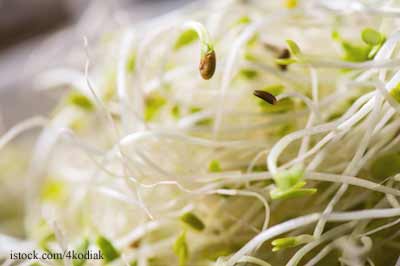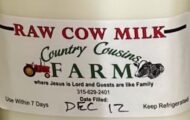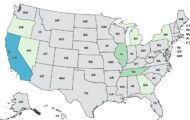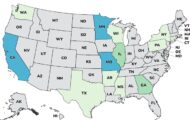The Wholesome Soy bean sprout Listeria outbreak in 2014 has a similar story to the first reported Listeria bean sprout outbreak in 2008. Both were discovered by routine testing.
 The 2008 outbreak included 20 cases reported between March 2008 and March 2009. Pulsed field gel electrophoresis (PFGE) tests showed all 20 patients were sickened by the same strain. The cases were reported from seven states: CA (1), MA(6), NY(6), NJ(4), MD(1), ME(1) and NH(1).
The 2008 outbreak included 20 cases reported between March 2008 and March 2009. Pulsed field gel electrophoresis (PFGE) tests showed all 20 patients were sickened by the same strain. The cases were reported from seven states: CA (1), MA(6), NY(6), NJ(4), MD(1), ME(1) and NH(1).
The case patients ranged in age range from 20 to 89. Sixty five percent were female, 21 percent were pregnant at the time of infection. All of them were hospitalized.
The source of the infections was unknown until the New York State Department of Agriculture and Markets found Listeria in sample of alfalfa sprouts and uploaded it to the Pulsenet, an inter-agency foodborne illness database, on April 6, 2009. It was a match to the outbreak strain.
The contaminated sprouts were from a producer in Bridgeport, CT and collected from a supermarket distributor in New York. Investigators from the Connecticut Department of Agriculture and U.S. Food and Drug Administration (FDA) inspected the producer’s facility. They collected environmental samples and sprout samples. Tests revealed the presence of Listeria in alfalfa sprouts, clover sprouts, sprout blends and at multiple locations throughout the facility and in spent irrigation water. The producer issued a recall and halted production.
The story is similar to the Wholesome Soy Listeria outbreak announced in November 2014. That outbreak sickened five people in Michigan and Illinois, killing two of them.
It was discovered during a routine FDA inspection at the company’s plant in Chicago from August 12 toSeptember 3, 2014. FDA investigators collected samples of mung bean sprouts and spent irrigation water.Twenty five of the samples collected were positive for Listeria.
Health officials used two tests , whole genome sequencing (WGS) and pulsed field gel electrophoresis (PFGE) to link sprouts produced by Wholesome Soy to four cases of listeriosis in Illinois and one case in Michigan. All five patients were hospitalized. During interviews, two of the surviving patients reported eating bean sprouts before they became ill.
When investigators from the U.S. Food and Drug Administration (FDA) inspected the Wholesome Soy Products Chicago facility in August and October, they found unsanitary conditions both times.
Wholesome issued a recall of the sprouts and is no longer in business,




